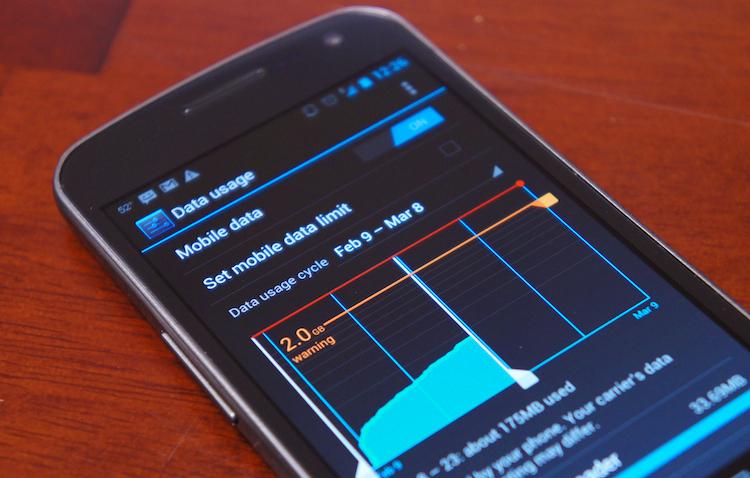
It's still hard to accept the fact that we've moved on from truly unlimited data to the era of tiered and throttled data plans. Gone are the days of being able to use 30 or more gigabytes of data from your phone without being penalized in one way or another from your carrier.
As it stands, Sprint is currently the only national carrier left that has continued to offer completely unlimited data without any stipulations. T-Mobile has adopted tiered plans where your data is throttled once you reach your data cap. And the two largest wireless providers in the States, Verizon and AT&T, have also put tiered plans in place, where the customer is automatically charged an overage fee – $10 per gigabyte until the end of the billing cycle – once they hit their cap.
The worst part is that there aren't any plans offered for power users anymore. Last month, we asked our readers how much data they use on average per month. Responses ranged from just a few hundred megabytes to north of 35GB in a single billing cycle. The largest cap offered by the major providers (excluding Sprint) is 12GB – offered by Verizon, which is actually a 10GB plan with the hotspot add on. This plan costs a staggering $100 per month.
Lucky for customers that already had an account with Verizon or AT&T, though, they were allowed to remain grandfathered into their unlimited data plans. But the ability to keep unlimited data didn't come without a hitch. Users with grandfathered, unlimited data plans are now subject to throttled data at a moment's notice and the carrier's discretion.
Both Verizon and AT&T admitted that they have started throttling data, but the claim is that it only affects the top five percent of users.
Five percent sounds like it should be a relatively low number. But when you consider just how many subscribers there are, it's a pretty significant figure. Verizon alone claims to have about 92.2 million retail customers. In their latest earnings report, it was noted that smartphone penetration has reached 44 percent, roughly 40.6 million subscribers. Doing the math (not counting those that use data on feature phones or those who may already be on tiered plans), the top five percent of data users equates to a very rough estimate of two million subscribers subjected to throttled speeds every month.
What's worse is that when you get throttled on Verizon, you remained throttled for the remainder of the billing period and the following month, too. With AT&T or T-Mobile, if you get throttled, your data speeds will return to normal once the billing cycle ends.
The whole idea of tiered plans and throttling is to relieve some of the stress on their "over-encumbered" networks. However, according to a recent study, throttling those pesky, lingering unlimited plans has little to no effect on consumers – other than being a nuisance and causing a bit of angst, that is. Zach Epstein of BGR reports:
"Validas extracted data from more than 55,000 cell phone bills belonging to AT&T and Verizon subscribers from 2011, and the firm sought to determine whether or not data throttling is necessary. According to Validas findings, throttling may indeed simply be a ploy to push unlimited users into newer tiered plans."
This isn't all that surprising, really. At least it shouldn't be. But it's certainly frustrating for the millions of subscribers who have been allowed to keep their old plans. I don't recall my unlimited data plan that I signed up for back in 2006 being throttled. Being threatened with throttled speeds hardly makes it the same plan it used to be, and negates both of the terms "grandfathered" and "unlimited" altogether. What's more are Validas' findings.
“When we look at the top 5% of data users, there is virtually no difference in data consumption between those on unlimited and those on tiered plans—and yet the unlimited consumers are the ones at risk of getting their service turned off.
So it’s curious that anyone would think the throttling here represents a serious effort at alleviating network bandwidth issues. After all, Sprint does seemingly fine maintaining non-throttled unlimited data for its customers."
Frankly, throttling doesn't bother me – when it's predetermined or absolutely necessary to maintain the quality of the network. I have a 2GB plan with T-Mobile. I pay less for it, so when I hit the 2GB cap, it's hard for me to be frustrated.
However, on a plan that is listed as "unlimited," it's tough to not get mad when you are getting throttled for using less data than someone on a tiered plan who is paying the same amount. In other words, users are getting throttled at 2GB, or sometimes less, on unlimited plans on AT&T's network. The unlimited data plan costs $30 per month, which is the same price as the largest tiered plan AT&T offers. That tiered plan, however, allows the customer to use 3GB before getting charged an overage fee.
If it has little effect on usage, then what's the point in throttling?
They're making unlimited data plans unpleasant for users, and choking power users out. And worst of all, they're not giving them enough viable options when it comes to tiered plans either. They're astronomically high for anyone who uses a substantial amount of data each month. To use 10GB per month (which is low for some users) on AT&T, it would cost $100 per month. So data heavy consumers are either forced to cope with turtle speeds or empty pockets.
What are you thoughts on throttled data, AT&T and Verizon customers? Is it a necessary step to control consumption and maintain the quality of the networks? Or is it just a ploy to choke users out and force them to transition to tiered plans? Have you ever been throttled? If so, at what point?